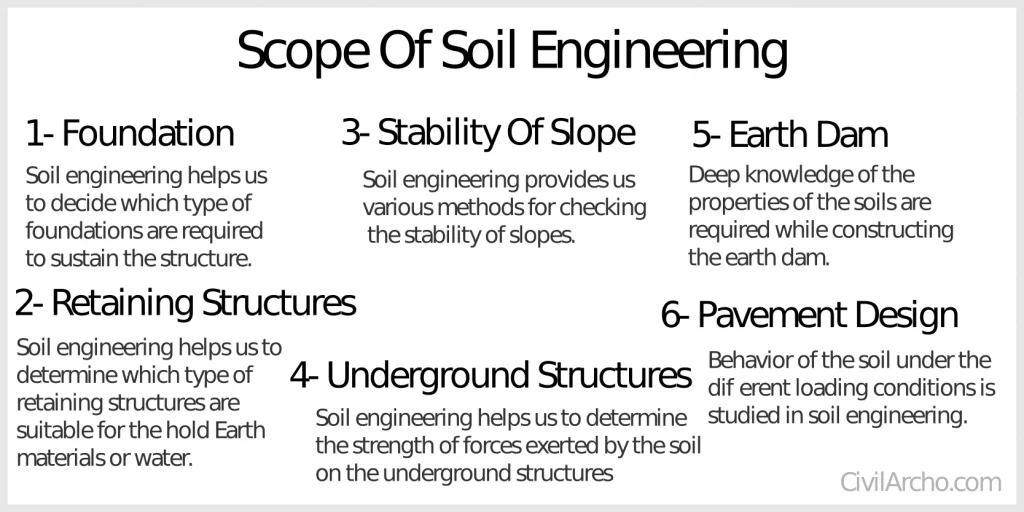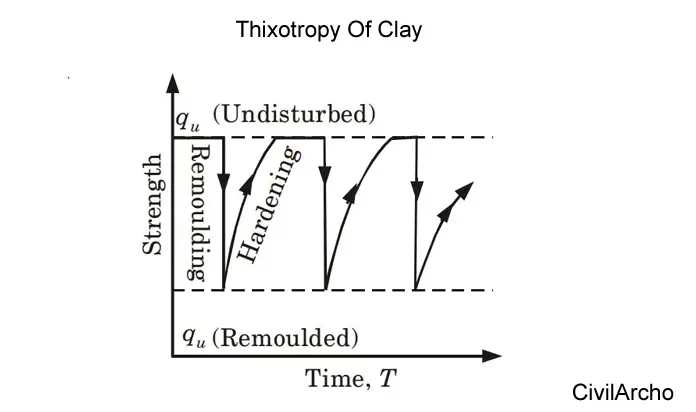Scope of Soil Engineering | Definition Of Soil, Soil Mechanics, & Soil Engineering
Definition Of Soil
The definition of soil in civil engineering is the soil that is produced by the disintegration of rocks and is composed of solid particles, unconsolidated material ( loosely arranged materials).
During the construction of any project, the top layer of the soil is removed because it contains a large quantity of organic matter which is not suitable for the construction material.
Definition Of Soil Mechanics
According to Dr. Karl Terzaghi who is the father of soil mechanics, ‘Soil mechanics is the application of the laws of mechanics and hydraulics to the engineering problems dealing with the sediments and other unconsolidated solid particles producing by the chemical and mechanical disintegration of rocks’.
So soil mechanics is the branch of mechanics that deals with the action of forces on soil and the flow of water in the soil.
Definition Of Soil Engineering
Soil engineering is dealing with the practical problems of the application of soil mechanics.
Soil engineering deals with the engineering problems such as site investigation, design of foundation, construction of the foundation, and earth-related structures.
Let’s dive into the scope of soil engineering-

Scope Of Soil Engineering
The scope of soil engineering in the construction field is very vast because all the civil engineering structures are lies on or below the surface of the soil.
Here is a list of the scope of soil engineering in the field of the construction industry-
1- Foundations
As we know all the constructions are lies on or below the surface of the soil such as buildings, bridges, dams, roads, etc.
Soil engineering helps us to determine the strength of soil and also helps us to decide which type of foundations are required to sustain the structure.
So for the stability of these structures foundations are required which transfer the structure load to the soils.
2- Retaining Structures
Soil engineering helps us to determine which type of retaining structure(such as walls, dams, barriers, or bins) is suitable for the hold Earth materials or water.
The soils are stable when they possess a definite slope if they do not have a definite slope then in this condition retaining structures are required to hold the soil in stable condition.
The retaining structures are built to retain the soil or water.
More Read-What Is Transported Soil And Residual Soil | Difference Between Transported And Residual Soil
3- Stability Of Slopes
In any region in the world which have no horizontal surface, there is a possibility of slope failure due to the movement of part of the mass downward direction.
Soil engineering provides us with various methods for checking the stability of slopes and gives the idea to stop slope failure.
4- Underground Structures
In civil engineering, the construction of underground structures such as tunnels, shafts, etc required the study of the force exerted by the soil on these types of underground structures.
Soil engineering helps us to determine the strength of forces exerted by the soil on underground structures.
5- Earth Dam
Construction of an earth dam required a deep knowledge of the soil on which the earth dam is going to be constructed and soil engineering helps us to acquire a deep knowledge of the soil.
As we all know the earth dam is a huge structure that is built the create water reservoirs and if the dam is failed then it creates lots of problems.
So deep knowledge of the properties of the soils is required while constructing the earth dam.
6- Pavement Design
The pavement is a hard crust that is provided on the surface of the road for the purpose of providing a smooth and strong surface on which vehicles can move easily.
The behavior of the soil under different loading conditions is studied in soil engineering.
More Read- Geotechnical Engineering Terms And Definitions
Limitations Of Soil Engineering
1- The solution of the theory of elasticity can not be applied directly because the soil does not possess a linear stress-strain relationship.
2- The soil has a three-phase solid, water, the air so the behavior of the soil depends upon the relative proportion of the three phases.
3- The behavior of the soil get changes after the shift of soil particles because the soil particles are free to move with respect to each other.
4- The property of the soil get change after the disturbance of the soil, so the tests are conducted carefully.
5- The strength and the behavior of the soil depend on the pressure, drainage, environment, and money factors so these changes must be considered.
More Read- Site Or Soil Exploration- Purposes, Stages, Depth Of Exploration
Frequently Asked Questions (FAQ)
Who is the father of soil mechanics?
The father of soil mechanics is Dr. Karl Terzaghi and he coined the term soil mechanics in 1925.
What is the definition of geotechnical engineering?
Geotechnical engineering is the study of soil engineering, rock mechanics, and geology.

